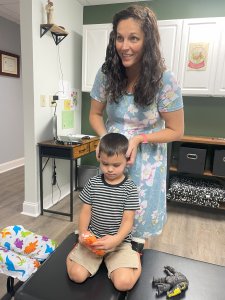 Does this sound familiar? Your child covers their ears at a birthday party, has a meltdown in a noisy grocery store, or refuses to wear clothes with itchy tags. As a parent, these moments can be heartbreaking and isolating. Maybe you’ve been told it’s just a phase, “bad behavior,” or something they’ll grow out of—but what if there’s a deeper reason behind these reactions?
Does this sound familiar? Your child covers their ears at a birthday party, has a meltdown in a noisy grocery store, or refuses to wear clothes with itchy tags. As a parent, these moments can be heartbreaking and isolating. Maybe you’ve been told it’s just a phase, “bad behavior,” or something they’ll grow out of—but what if there’s a deeper reason behind these reactions?
At New Hope Chiropractic, we know there’s often more going on beneath the surface: it’s all about your child’s nervous system.
Understanding Sensory Processing Challenges
If you’ve watched your child struggle with sensory overload, you are not alone. Recent studies show that up to 40% of school-aged children face at least one chronic health condition, with sensory processing issues becoming more common.
But here’s the thing—these sensory responses aren’t simply behavioral. They’re rooted in how your child’s brain and nervous system process information.
Why the Nervous System Matters
Your child’s nervous system acts as the command center for their entire body, constantly processing sensory input from their environment.
There are two key branches:
- Sympathetic Nervous System: The “fight or flight” response
- Parasympathetic Nervous System: The “rest and digest” response
When sensory input becomes overwhelming, your child’s nervous system can get stuck in “fight or flight” mode, leading to:
✅ Difficulty sleeping
✅ Digestive issues
✅ Emotional dysregulation
✅ Heightened sensory sensitivity
The “Perfect Storm” of Sensory Overload
Sensory processing challenges often develop due to a combination of factors we call “The Perfect Storm”:
- Prenatal Stress: Maternal stress during pregnancy can impact a child’s nervous system development.
- Birth Interventions: C-sections, vacuum extractions, or forceps deliveries can cause physical stress to the brainstem and nervous system.
- Early Childhood Challenges: Environmental toxins, developmental delays, and repeated illnesses can compound nervous system stress.
These factors create nervous system imbalances, making it harder for children to process sensory input.
Recognizing Sensory Overload
As a parent, you may notice these signs when your child is overstimulated:
? Physical Signs: Headaches, nausea, or unusual fatigue
? Emotional Signs: Increased irritability, anxiety, or sudden outbursts
? Behavioral Signs: Trouble focusing, frequent meltdowns, or seeking quiet spaces
A New Approach That Gets to the Root Cause
Traditional advice often focuses on avoiding triggers or managing symptoms, but at New Hope Chiropractic, we take a different approach.
Our Neurologically-Focused Chiropractic Care targets the root cause of nervous system imbalance. Here’s how we help:
1️⃣ Advanced Neurological Scans: Using state-of-the-art INSiGHT Scans, we assess your child’s nervous system function. These gentle, non-invasive scans provide critical insights, pinpointing areas where their system is under stress.
2️⃣ Customized Care Plans: Based on scan results, we create personalized care plans tailored to your child’s unique needs.
3️⃣ Gentle, Precise Adjustments: Our specific, gentle adjustments release “stuck” stress and activate the parasympathetic system, helping your child achieve better sensory regulation naturally—without medications.
Hope for Your Child’s Future
Your child isn’t choosing to be overwhelmed—their nervous system is genuinely struggling. The great news is that with proper care and understanding, they can thrive in their environment without being overwhelmed by it.
You are not alone in this journey. At New Hope Chiropractic, we’ve seen countless families experience incredible transformations.
? Happier moods
? Better sleep
? Improved focus
? Easier sensory regulation
If you’re ready to help your child find balance and thrive naturally, please reach out to us today to schedule a consultation. And if you’re not local to us, we can help you find a PX Docs office near you.
Your child’s sensitivity is a strength, not a flaw—and we’re here to help them unlock their full potential.

